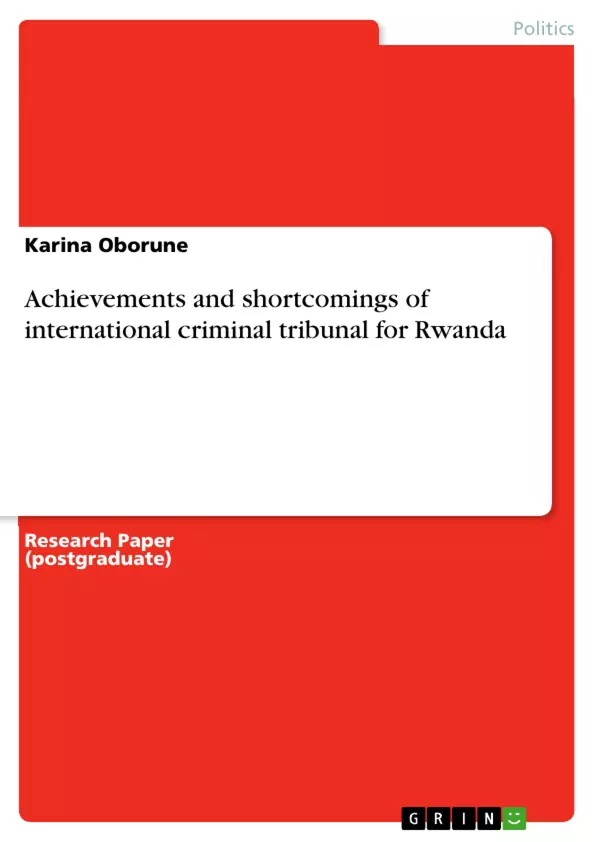ABSTRACT
Aim of paper
This paper deals with the effectiveness and achievements of ICTR that can be viewed in light of aims set out in the UN Resolution 955, 1994. In the Resolution UN is determined to: 1) have effective application and enforcement of restrictions against the warfare perpetrators; 2) bring justice and ensure that violations are halted; 3) have fair trials; 4) contribute to criminal justice and process of reconciliation and restoration and maintenance of peace.
Hypotheses
In the present paper author put forward two hypotheses. The first hypothesis is that creation of ICTR was a logical, but moderate step, which would have not been necessary if global society would have appropriately reacted to previous warnings about possible genocide in Rwanda. The second hypothesis is that ICTR was merely a vehicle of justice, but it is hardly designed as a vehicle for reconciliation.
Analytical framework
Author has discussed the work of ICTR and refer to particular aims, possibility of their achievement and assess outcomes. Author used three tools of analytical framework: legal, political and economical, as from these different standing points it is possible to assess the work of ICTR in its entirety. Legal aspects of work of ICTR extend from mere procedural points to ICTR’s contribution to legal tradition and legal developments. Author depicted which of legal aspects have undermined the authority and image of ICTR, as well as could be deemed as actual shortcomings, and how these aspects influence achievement of justice as the ultimate goal of legal authority. Financial aspect shows the costs of ICTR, but political aspect deals with assessment of set goals in the Resolution and bringing justice as a prerogative, as it is expected to be effective and appropriate.
Main conclusions
The paper shows that while making a significant contribution to the law of genocide and international criminal justice and establishing historical record (achievements), ICTR was incapable in reconciliation of witnesses and survivors and was described as “job creation for foreigners” (shortcomings).
Inhaltsverzeichnis (Table of Contents)
- ABSTRACT
- 1. INTRODUCTION.
- 2. ANALYSIS OF GENOCIDE..
- Genocide characteristics
- Humanitarian intervention
- Ignorance of genocide...
- 3. THE INTERNATIONAL CRIMINAL TRIBUNAL FOR RWANDA (ICTR)
- Creation of ICTR
- Landmark Cases of the International Criminal Tribunal for Rwanda
- 4. LEGAL, FINANCIAL AND POLITICAL ASPECTS.
- Evaluation of ICTR..
- Analytical framework
- 4.1. LEGAL ASPECT.
- 4.2. FINANCIAL ASPECT
- 4.3. POLITICAL ASPECT.
- Evaluation of ICTR..
- CONCLUSION.
Zielsetzung und Themenschwerpunkte (Objectives and Key Themes)
This paper aims to evaluate the effectiveness and achievements of the International Criminal Tribunal for Rwanda (ICTR) in light of the objectives outlined in the UN Resolution 955, 1994. The paper considers the ICTR's role in enforcing restrictions against perpetrators of the Rwandan genocide, bringing justice, ensuring fair trials, contributing to criminal justice, and promoting reconciliation and peace.
- The effectiveness of the ICTR in achieving justice for victims of the Rwandan genocide.
- The contribution of the ICTR to the development of international criminal law, particularly in relation to genocide and crimes against humanity.
- The role of the ICTR in promoting national reconciliation and peace in Rwanda.
- The limitations and challenges faced by the ICTR, including its impact on procedural justice and its effectiveness in achieving reconciliation.
- The financial costs of the ICTR and their implications for development and social programs in Rwanda.
Zusammenfassung der Kapitel (Chapter Summaries)
The paper begins by providing an overview of the Rwandan genocide and its impact on the region. Chapter 2 delves into the characteristics of the genocide, exploring its historical context, the motivations behind the killings, and the role of political and social factors in fueling the violence. Chapter 3 discusses the establishment of the ICTR, highlighting its mandate and its key legal frameworks. It explores the ICTR's successes and shortcomings in conducting trials and delivering justice.
Chapter 4 examines the legal, financial, and political aspects of the ICTR. It analyzes the ICTR's contributions to international criminal law, including the development of the law of genocide and the establishment of universal liability. The chapter also evaluates the ICTR's financial costs and their implications for development and peace-building in Rwanda. The chapter concludes by discussing the ICTR's role in promoting national reconciliation and peace, and its limitations in achieving these objectives. The paper does not include a summary of the conclusion.
Schlüsselwörter (Keywords)
The paper examines the ICTR's impact on international criminal justice, genocide, human rights, humanitarian intervention, reconciliation, and peacebuilding. The work also focuses on the role of the ICTR in promoting national reconciliation and its effectiveness in achieving justice, as well as the legal, financial, and political challenges faced by the tribunal.
Frequently Asked Questions
What was the primary mandate of the ICTR?
Established by UN Resolution 955 in 1994, the ICTR was mandated to prosecute persons responsible for genocide and other serious violations of international humanitarian law in Rwanda.
Did the ICTR succeed in promoting national reconciliation?
The paper argues that while the ICTR was a 'vehicle of justice,' it was hardly designed for reconciliation, often failing to connect with survivors and witnesses on the ground.
What were the landmark legal contributions of the ICTR?
The ICTR made significant contributions to the law of genocide, including the first conviction for genocide by an international court and defining rape as a means of perpetrating genocide.
What were the main shortcomings of the tribunal?
Shortcomings included high financial costs, slow proceedings, and a perception that it was a 'job creation program for foreigners' rather than a benefit to the Rwandan people.
How did the global society react prior to the genocide?
The paper notes a significant failure and ignorance by the global society, which ignored early warnings of the impending genocide, making the ICTR a necessary but belated step.
- Citation du texte
- Karina Oborune (Auteur), 2009, Achievements and shortcomings of international criminal tribunal for Rwanda, Munich, GRIN Verlag, https://www.grin.com/document/160068



